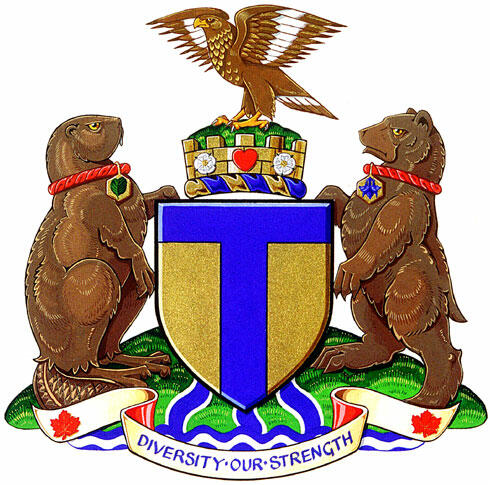The contents of this Register are intended for research purposes only. The heraldic emblems found in the Register may not be reproduced in any form or in any media without the written consent of the Canadian Heraldic Authority and/or the recipient.
Toronto, Ontario
Grant of Arms and Supporters
January 11, 1999
Vol. III, p. 291
Arms of the City of TorontoBlazonOr a chief-pale Azure; SymbolismThe gold sections allude to the two towers of Toronto City Hall, creating the letter T between them. |
CrestBlazonIssuant from a mural crown Or charged with a heart Gules between two roses Argent barbed Vert seeded Or a mound Vert thereon a golden eagle wings raised proper; SymbolismThe eagle, known for its strength, bravery and power, is a symbol used by the Mississaugas of the New Credit First Nation and the Huron-Wendat Nation, on whose traditional territory the City of Toronto is now located. The mural crown is a symbol of municipal authority. The two white roses, traditionally associated with the royal house of York, represent the City of York and the Borough of East York, two predecessor municipalities of the current City of Toronto. The heart represents the City of North York, another predecessor municipality, which used a heart as its emblem. |
MottoBlazonDIVERSITY OUR STRENGTH; SymbolismThis phrase refers to the multicultural dimension of the city and to the seven municipalities that formed what is now the City of Toronto. |
SupportersBlazonOn a mound Vert rising above barry wavy Azure and Argent and charged with three pales wavy Azure fimbriated Argent dexter a beaver proper gorged with a cord Gules pendant therefrom a hexagon Or charged with an alder leaf Vert sinister a bear proper gorged with a cord Gules pendant therefrom a hexagon Or charged with a columbine flower Azure; SymbolismThe beaver has appeared on the coat of arms of the City of Toronto since 1834 and is a symbol of industry. The bear symbolizes strength, determination, caring and protection of its offspring. The hexagon represents a honeycomb cell and, by extension, energy and productivity. The alder leaf appeared in the arms of the City of Etobicoke, and the columbine flower in the arms of the City of Scarborough, both of which were predecessor municipalities to the current City of Toronto. The wavy bands at the base represent the Humber, Don and Rouge rivers flowing into Lake Ontario. |
Additional InformationCreator(s)Original concept of Robert D. Watt, Chief Herald of Canada, assisted by the heralds of the Canadian Heraldic Authority. PainterLinda Nicholson CalligrapherNancy Ellis Recipient TypeCivil Institution
|



